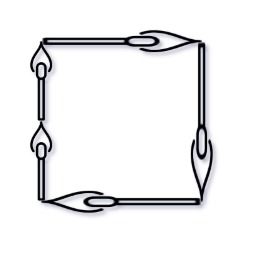| comments | difficulty | edit_url | tags | |||||
|---|---|---|---|---|---|---|---|---|
true |
Medium |
|
You are given an integer array matchsticks where matchsticks[i] is the length of the ith matchstick. You want to use all the matchsticks to make one square. You should not break any stick, but you can link them up, and each matchstick must be used exactly one time.
Return true if you can make this square and false otherwise.
Example 1:
Input: matchsticks = [1,1,2,2,2] Output: true Explanation: You can form a square with length 2, one side of the square came two sticks with length 1.
Example 2:
Input: matchsticks = [3,3,3,3,4] Output: false Explanation: You cannot find a way to form a square with all the matchsticks.
Constraints:
1 <= matchsticks.length <= 151 <= matchsticks[i] <= 108
class Solution:
def makesquare(self, matchsticks: List[int]) -> bool:
def dfs(u):
if u == len(matchsticks):
return True
for i in range(4):
if i > 0 and edges[i - 1] == edges[i]:
continue
edges[i] += matchsticks[u]
if edges[i] <= x and dfs(u + 1):
return True
edges[i] -= matchsticks[u]
return False
x, mod = divmod(sum(matchsticks), 4)
if mod or x < max(matchsticks):
return False
edges = [0] * 4
matchsticks.sort(reverse=True)
return dfs(0)class Solution {
public boolean makesquare(int[] matchsticks) {
int s = 0, mx = 0;
for (int v : matchsticks) {
s += v;
mx = Math.max(mx, v);
}
int x = s / 4, mod = s % 4;
if (mod != 0 || x < mx) {
return false;
}
Arrays.sort(matchsticks);
int[] edges = new int[4];
return dfs(matchsticks.length - 1, x, matchsticks, edges);
}
private boolean dfs(int u, int x, int[] matchsticks, int[] edges) {
if (u < 0) {
return true;
}
for (int i = 0; i < 4; ++i) {
if (i > 0 && edges[i - 1] == edges[i]) {
continue;
}
edges[i] += matchsticks[u];
if (edges[i] <= x && dfs(u - 1, x, matchsticks, edges)) {
return true;
}
edges[i] -= matchsticks[u];
}
return false;
}
}class Solution {
public:
bool makesquare(vector<int>& matchsticks) {
int s = 0, mx = 0;
for (int& v : matchsticks) {
s += v;
mx = max(mx, v);
}
int x = s / 4, mod = s % 4;
if (mod != 0 || x < mx) return false;
sort(matchsticks.begin(), matchsticks.end(), greater<int>());
vector<int> edges(4);
return dfs(0, x, matchsticks, edges);
}
bool dfs(int u, int x, vector<int>& matchsticks, vector<int>& edges) {
if (u == matchsticks.size()) return true;
for (int i = 0; i < 4; ++i) {
if (i > 0 && edges[i - 1] == edges[i]) continue;
edges[i] += matchsticks[u];
if (edges[i] <= x && dfs(u + 1, x, matchsticks, edges)) return true;
edges[i] -= matchsticks[u];
}
return false;
}
};func makesquare(matchsticks []int) bool {
s := 0
for _, v := range matchsticks {
s += v
}
if s%4 != 0 {
return false
}
sort.Sort(sort.Reverse(sort.IntSlice(matchsticks)))
edges := make([]int, 4)
var dfs func(u, x int) bool
dfs = func(u, x int) bool {
if u == len(matchsticks) {
return true
}
for i := 0; i < 4; i++ {
if i > 0 && edges[i-1] == edges[i] {
continue
}
edges[i] += matchsticks[u]
if edges[i] <= x && dfs(u+1, x) {
return true
}
edges[i] -= matchsticks[u]
}
return false
}
return dfs(0, s/4)
}impl Solution {
pub fn makesquare(matchsticks: Vec<i32>) -> bool {
let mut matchsticks = matchsticks;
fn dfs(matchsticks: &Vec<i32>, edges: &mut [i32; 4], u: usize, x: i32) -> bool {
if u == matchsticks.len() {
return true;
}
for i in 0..4 {
if i > 0 && edges[i - 1] == edges[i] {
continue;
}
edges[i] += matchsticks[u];
if edges[i] <= x && dfs(matchsticks, edges, u + 1, x) {
return true;
}
edges[i] -= matchsticks[u];
}
false
}
let sum: i32 = matchsticks.iter().sum();
if sum % 4 != 0 {
return false;
}
matchsticks.sort_by(|x, y| y.cmp(x));
let mut edges = [0; 4];
dfs(&matchsticks, &mut edges, 0, sum / 4)
}
}class Solution:
def makesquare(self, matchsticks: List[int]) -> bool:
@cache
def dfs(state, t):
if state == (1 << len(matchsticks)) - 1:
return True
for i, v in enumerate(matchsticks):
if state & (1 << i):
continue
if t + v > s:
break
if dfs(state | (1 << i), (t + v) % s):
return True
return False
s, mod = divmod(sum(matchsticks), 4)
matchsticks.sort()
if mod:
return False
return dfs(0, 0)